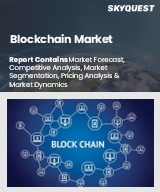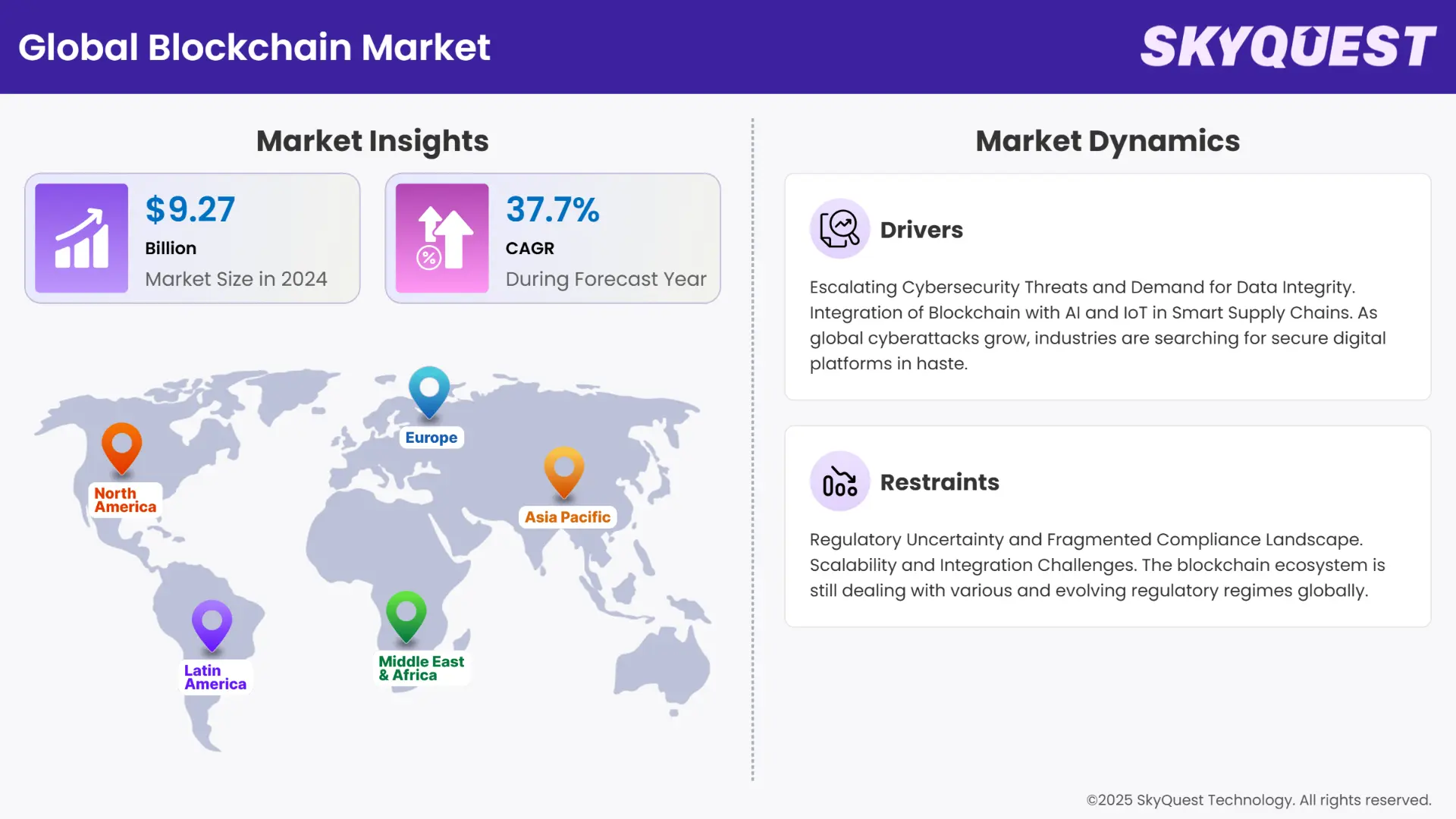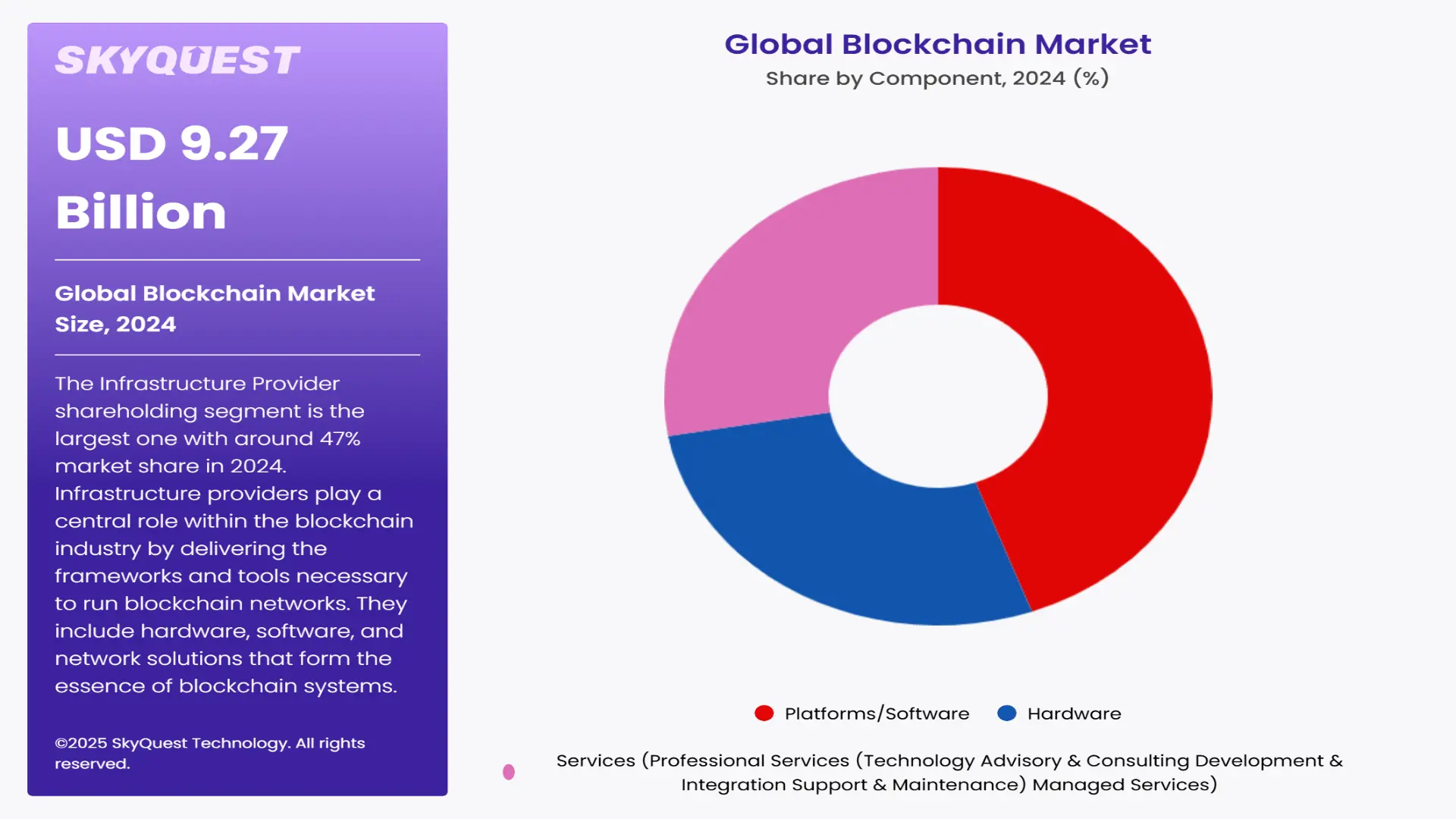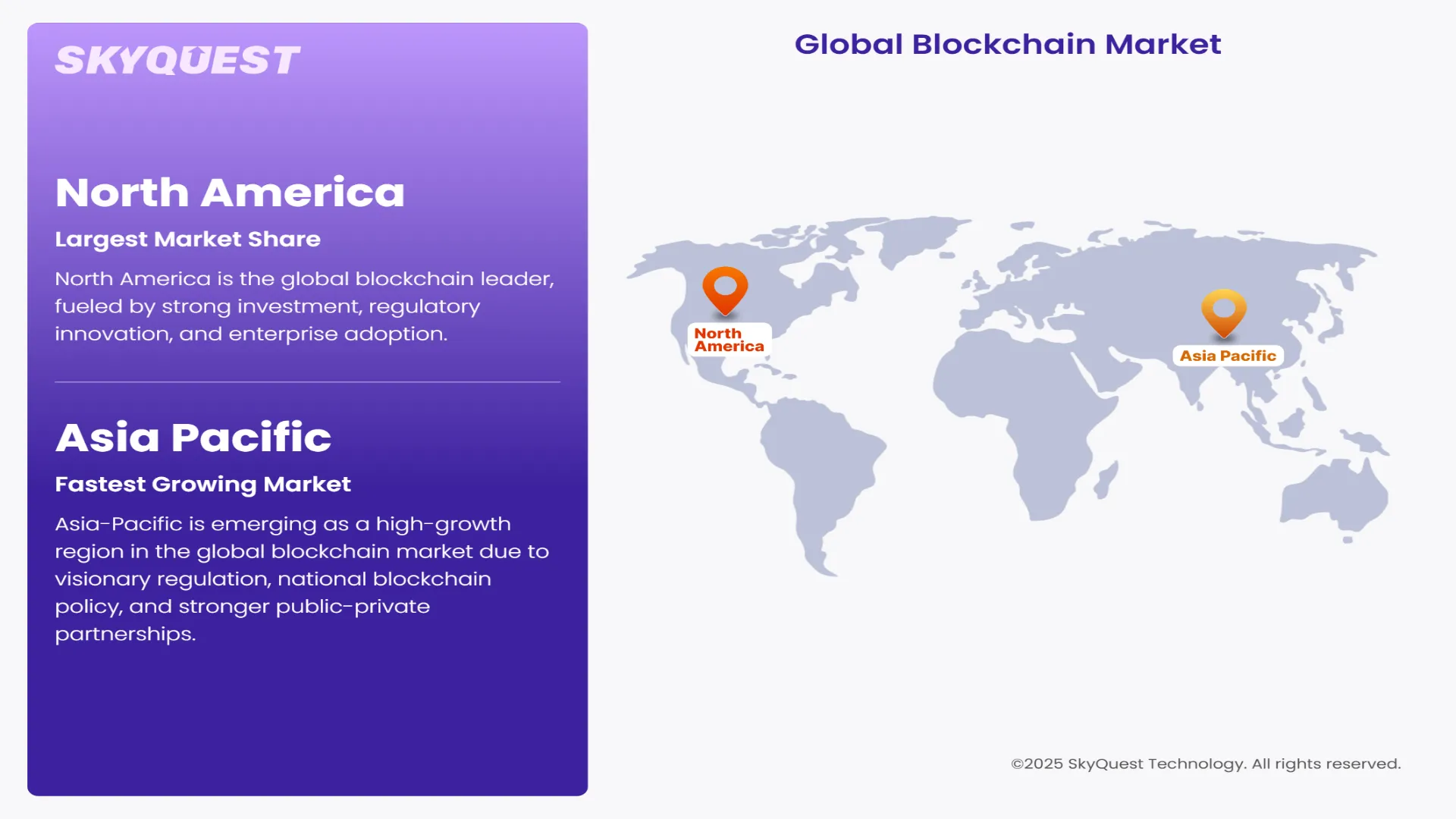
Report ID: SQMIG45A2610

Report ID: SQMIG45A2610
sales@skyquestt.com
USA +1 351-333-4748

Report ID:
SQMIG45A2610 |
Region:
Global |
Published Date: December, 2025
Pages:
183
|Tables:
148
|Figures:
68



Global Blockchain Market size was valued at USD 9.27 Billion in 2024 and is expected to grow significantly from USD 12.76 Billion in 2025 to USD 165 Billion by 2033, growing at a CAGR of 37.7% in the forecast period (2026–2033).
The global blockchain industry is experiencing dynamic change fueled by increasing enterprise uptake across finance, supply chain, healthcare, and public sector platforms. Some of the key drivers for growth include increasing demand for tamper-evident and decentralized transaction systems due to increasing data privacy and cyber-attack risks. Enterprises are transitioned from pilots to live deployments, especially in cross-border payments, identity verification, and tokenization of assets. Moreover, regulatory momentum, particularly in the EU, UAE, and most of Asia, is creating a bullish environment for blockchain innovation, pushing companies to integrate compliance-fit distributed ledger solutions into their digital agendas.
Emerging trends such as the convergence of blockchain with artificial intelligence (AI), Internet of Things (IoT), and zero-knowledge proofs (ZKP) are reshaping operational models in different sectors. Blockchain traceability is being quickly integrated into ESG reporting models and pharma supply chains to render them transparent and compliant. Web3 and decentralized finance (DeFi) platforms are also expanding the application base of blockchain, both drawing institutional investors as well as technology startups. Layer 2 scaling solutions and interoperability protocols are also coming to the forefront, solving blockchain's long standing speed, scalability, and cost bottlenecks, thus unleashing broader commercial value beyond early adoption.
Despite promising, the blockchain industry confronts structural issues that can temper its short-term course. Disjointed regulatory environments in jurisdictions, electricity usage concerns of some consensus algorithms, and absence of qualified resources still limit scalable implementation. Moreover, the speculative form of crypto assets, too often confused with enterprise blockchain inherently brings volatility and distrust among vested interests. Vendors and consortia would thus need to wade through a complicated environment of technological, regulatory, and reputational risks to be able to maximally exploit the changing blockchain opportunity.
How AI is Transforming the Blockchain Market?
Artificial Intelligence (AI) is powerfully revolutionizing the way the world of blockchain works by making it efficient, scalable, and secure. The amazing data processing potential of AI when paired with the secure and transparent blockchain platform are deemed to be the foundation blocks to change the efficiency, security, and scalability of digital systems. Such collaboration promises innovation in domains like smart contracts, self-organizing organizations, and fraud detection. The excitement represents the increasing trend in the technology sector to combine innovative technologies in order to accelerate decentralization in many different digital applications and services.
A recent innovation reinforcing this shift is the sudden rise of AI-specific crypto tokens as a high conviction investment theme for 2025. These tokens have recorded an impressive USD 10 billion increase in market capitalization within one week alone, with leading assets seeing more than 100% gains. This trend indicates real advancement in AI agent technology being combined with blockchain infrastructure to address several use cases, ranging from driving decentralized AI applications, facilitating secure data sharing for machine learning, and the automation of financial services. Investors are also increasingly considering AI tokens to be long-term asset classes with strong growth prospects as AI and blockchain technologies converge.

To get more insights on this market click here to Request a Free Sample Report
Global Blockchain Market is segmented by blockchain layers, component, providers, type, organization, application, end user, and geography. The market is categorized by blockchain layers on the basis of layer 0, layer 1, layer 2, and layer 3. On the basis of component, the market is categorized by platforms/software, hardware, services. The market is categorized by providers by application provider, infrastructure provider, and middleware provider. On the basis of type, the market is categorized by private, public, and hybrid. The market is categorized by organization on the basis of SMEs, large enterprises, and government. On the basis of application, the market is categorized by supply chain management, cryptocurrencies, financial services, smart contracts, internet of things, gaming, and others. On the basis of end user, the market is categorized by BFSI, healthcare & lifesciences, media & entertainment, retail & ecommerce, manufacturing, transportation & logistics, IT & telecom, real estate & construction, energy & utilities, agriculture & food, and others. On the basis of geography, the market is categorized by North America, Europe, Asia Pacific, Latin America, and Middle East and Africa.
Layer 1 segment is the strongest with more than 50% market share in 2024. Layer 1 blockchains are built around the idea that they are decentralized, which provides them with strong security and transparency. The immutable ledger kept by the blockchains on which data and transactions cannot be tampered with once stored is crucial for finance, supply chain management, among others. Growing recognition of the benefits is attracting greater investment and growth in the Layer 1 ecosystem. Governments, businesses, and start-ups are searching for and deploying Layer 1 technology to be more efficient, save money, and provide data integrity.
The growth estimate for the Layer 1 segment over 2025-2032 is a reflection of accelerating momentum within the sector. There are several key drivers behind this expansion. First, expansion within decentralized finance (DeFi) platforms, which are reliant on Layer 1 blockchains for functionality, is a key driver. DeFi applications provide lending, borrowing, and trading operations without middlemen through the use of decentralization and security of Layer 1 networks. Secondly, increased adoption of non-fungible tokens (NFTs) is also contributing to the expansion of Layer 1 blockchains. NFTs, as distinct digital content authenticated on the blockchain, demand the secure, transparent ledger provided by Layer 1 blockchains.
The Infrastructure Provider shareholding segment is the largest one with around 47% market share in 2024. Infrastructure providers play a central role within the blockchain industry by delivering the frameworks and tools necessary to run blockchain networks. They include hardware, software, and network solutions that form the essence of blockchain systems. The dominance of the segment is driven by the imperative need for safe, scalable, and effective blockchain infrastructure to facilitate an enormous set of applications across sectors.
One of the prime growth drivers in the Infrastructure Provider segment is the increasing adoption of blockchain technology by industries spanning from finance, healthcare, supply chain and government services. Banks, for example, employ blockchain infrastructure to make transactions secure, prevent fraud, and enable cross-border payments. The immutability and transparency provided by blockchain ledgers allow them to serve such applications best, thereby propelling demand for robust infrastructure solutions.

To get detailed segments analysis, Request a Free Sample Report
North America is the global blockchain leader, fueled by strong investment, regulatory innovation, and enterprise adoption. The U.S. is at the forefront with strategic moves such as the launch of the Financial Innovation Act and federal stablecoin rulemaking developments that bring legal certainty to digital assets. Major technology players like IBM, Microsoft, and Amazon Web Services are expanding blockchain infrastructure and software, and banks are increasingly exploring tokenization of real-world assets. Also, venture capital remains strong, with US-based blockchain startups raising large sums in areas including DeFi, AI-blockchain convergence, and commercial grade blockchain solutions, retaining the region's leadership in innovation and commercialization.
The US blockchain environment further matures through both regulatory progress and expanding institutional investment. The latest indication of US Senate activity towards regulating stablecoins follows efforts to impart legal certainty on digital assets, enhance consumer protection, and promote innovation. Some Mastercard integrations from the private sector include facilities for payment with stablecoins through collaborations, for instance, with MoonPay, where one pays for real-world transactions using stablecoin conversions like USDC to local currencies. These advancements again affirm the US's determination to remain ahead of the curve for blockchain technology and applications.
Canada's blockchain industry is picking up speed by coordinated regulatory effort and clever industry to industry partnerships. The federal 2024 budget would take up the OECD's Crypto-Asset Reporting Framework for yet another step in transparency and would help Canada remain competitive with the world standard. The Canadian Web3 Council also released guidance to update the financial system, calling for open rules as well as digital asset custody capabilities. Among the most significant events is the attempt of the Canadian Blockchain Consortium to advance policies that will be friendly towards adopting blockchain technology in various industries. This concerted action proves the willingness of Canada to develop a healthy and vibrant blockchain ecosystem.
Asia-Pacific is emerging as a high-growth region in the global blockchain market due to visionary regulation, national blockchain policy, and stronger public-private partnerships. China leads with its Blockchain-based Service Network (BSN), which makes enterprise-blockchain deployment across sectors more accessible. Japan is pushing the adoption of Web3 with government-supported projects, bringing in South Korea's Digital New Deal that fosters blockchain use in public administration and logistics. The central bank of India, RBI, is experimenting with central bank digital currency (CBDC) initiatives, as well as increased use of blockchain for supply chains and identity authentication. There is also increased investment in the region by tech giants and startups, that is, in decentralized finance, gaming, and cross-border payment platforms.
China's blockchain sector is picking up speed with strategic state-led initiatives and rapid technology roll-outs. In January 2025, China announced a USD 54.5 billion national blockchain strategy to build a complete data infrastructure within five years by 2029. The ambitious roadmap aims at sectors such as supply chain, digital currency, and public services. One such milestone is the Blockchain-based Service Network (BSN), a government-sponsored platform enabling blockchain adoption across industries. Besides, China's central bank is pushing forward with the digital yuan (e-CNY), bringing it into public transportation and cross-border payments. These initiatives reflect China's determination to be at the forefront of blockchain technology and its uses.
Japan's blockchain industry is accelerating with government-savvy initiatives and business strategic steps. In August 2024, Sony partnered with StarTale to create Soneium, an Ethereum Layer 2 solution that would be scalable infrastructure for Web3 apps. Sony initiated the Soneium Spark incubation program, giving developers infrastructure access, mentorship, and capital opportunities up to USD 100,000. Additionally, Sony Bank revealed its intention to launch a yen-backed stablecoin, which further indicates its expanding presence in the Web3 ecosystem. These actions reaffirm Japan's commitment to drive innovation and adoption of blockchain technology across various industries.
South Korea's blockchain industry is picking up pace due to effective strategic business along with ease of adaptation in regulations. In 2024, Naver and Kakao merged their blockchain businesses to expand "Kaia," Asia's largest blockchain ecosystem by goals Layer-1 blockchain ecosystem. The partnership utilizes the massive consumer base of Kakao and technological capabilities of Naver to foster the use of decentralized applications (dApps) and Web3 solutions. Apart from that, Samsung also integrated Uppsala Security's artificial intelligence-based security solution Chainkeeper into its Blockchain Wallet, another step of protection for users from malicious behavior. All these point to South Korea's aspiration to become the global leader in blockchain technology.
Europe is a global blockchain economy hub, powered by forward-thinking regulation and strong institutional activity. The EU Markets in Crypto-Assets (MiCA) regulation, arriving in 2024, provides legal certainty and powers innovation among member states. Germany and France are at the forefront of blockchain adoption in banking, real estate tokenization, and trading energy. The European Blockchain Services Infrastructure (EBSI) enables cross-border digital public services based on blockchain. Furthermore, the region is experiencing higher investment for blockchain startups and consortium pilots in supply chain, healthcare, and identity management, indicating bottom-line support for decentralized technologies across sectors.
Germany's blockchain landscape is gaining momentum with a combination of regulatory evolution, institutional adoption, and robust startup environment. Introducing the Markets in Crypto-Assets Regulation (MiCAR) in 2024 has provided legal certainty that is supporting innovation without injuring consumers. Major financial institutions like DZ Bank and Deutsche Bank have established digital custody platforms that enable safe custody and settlement of digital assets. Also, the German government has encouraged blockchain projects, e.g., the Future Finance Act, allowing for the issuance of electronic securities by utilizing blockchain technology, which improves efficiency and clarity in finance. All these trends demonstrate that Germany is determined to become a world leader in blockchain technology as well as its applications.
France's blockchain sector is accelerating on the back of an unblemished combination of regulatory flexibility, institutional adoption, and investment framework. The parliamentary approval of the Markets in Crypto-Assets Regulation (MiCA) into legislation in 2024 had provided regulatory certainty, which had spurred innovation as well as consumer safeguards. Most prominently, BPCE Group, France's fifth largest bank, rolled out a crypto investment service via its subsidiary Hexarq after winning approval from the AMF. Further, the French state-owned investment bank Bpifrance pledged up to USD 25 million to buy cryptocurrencies with the target of backing French crypto firms and making France a key player in the global digital assets world.
The UK blockchain industry is seeing notable momentum, fueled by smart regulatory advancements and institutional investment. The Financial Conduct Authority's (FCA) recent approval of Galaxy Digital to trade derivatives represents a key milestone toward the inclusion of digital assets in mainstream finance. Meanwhile, Fnality International has established a blockchain sterling payment system, backed by the biggest lenders including Barclays and UBS, proving the institutional uptake in the industry. These breakthroughs prove the UK's ambitions of fostering a flourishing blockchain ecosystem, making it a growing hub for digital asset innovation.

To know more about the market opportunities by region and country, click here to
Buy The Complete Report
Escalating Cybersecurity Threats and Demand for Data Integrity
Integration of Blockchain with AI and IoT in Smart Supply Chains
Regulatory Uncertainty and Fragmented Compliance Landscape
Scalability and Integration Challenges
Request Free Customization of this report to help us to meet your business objectives.
The blockchain market is experiencing a more competitive environment driven by technology, strategic collaborations, and expansion geographically. Aptos Labs is turning out to be one of the major players with a multilateral approach aimed at international reach and technological convergence. It entered the Japanese blockchain space in October 2024 when it acquired HashPalette Inc., enhancing its footprints in Asia. The next month, it spearheaded a USD 10 million funding round for KGeN, a decentralized gaming network, as a testament to its ongoing pursuit of accelerating the Web3 ecosystem. Additionally, Aptos Labs has established high-impact collaborations with Microsoft to investigate blockchain-AI synergy and Google Cloud to enhance infrastructure capabilities, including operating a validator node on the Aptos network. These strategic initiatives reinforce its vision to expand blockchain uptake across sectors and improve performance, trust, and usability in digital services.
Emerging Trends Shaping the Future of Blockchain
SkyQuest’s ABIRAW (Advanced Business Intelligence, Research & Analysis Wing) is our Business Information Services team that Collects, Collates, Correlates, and Analyses the Data collected using Primary Exploratory Research backed by robust Secondary Desk research.
The blockchain technology market is poised to grow robustly, supported by accelerating adoption in a wide range of industry segments and continued technological innovation. Emerging trends such as the convergence of blockchain with artificial intelligence (AI), increasing decentralized finance (DeFi), and wider deployment of enterprise-class blockchain solutions are reshaping digital ecosystems worldwide. Regions like North America and Asia-Pacific lead in investment and clarity of regulations, while Europe evolves with harmonized regimes like MiCA, to create an ideal ecosystem for blockchain innovation. Despite issues like regulatory uncertainty and scalability, government-backed programs and strategic collaborations are raising market confidence. As blockchain technology increasingly supports digital identity, supply chain transparency, and modernized financial services, its revolutionary potential is projected to grow, fueling major market opportunities from 2030 and beyond. This changing landscape underscores blockchain's key role in facilitating secure, transparent, and efficient digital transactions worldwide.
| Report Metric | Details |
|---|---|
| Market size value in 2024 | USD 9.27 Billion |
| Market size value in 2033 | USD 165 Billion |
| Growth Rate | 37.7% |
| Base year | 2024 |
| Forecast period | 2026-2033 |
| Forecast Unit (Value) | USD Billion |
| Segments covered |
|
| Regions covered | North America (US, Canada), Europe (Germany, France, United Kingdom, Italy, Spain, Rest of Europe), Asia Pacific (China, India, Japan, Rest of Asia-Pacific), Latin America (Brazil, Rest of Latin America), Middle East & Africa (South Africa, GCC Countries, Rest of MEA) |
| Companies covered |
|
| Customization scope | Free report customization with purchase. Customization includes:-
|
To get a free trial access to our platform which is a one stop solution for all your data requirements for quicker decision making. This platform allows you to compare markets, competitors who are prominent in the market, and mega trends that are influencing the dynamics in the market. Also, get access to detailed SkyQuest exclusive matrix.
Table Of Content
Executive Summary
Market overview
Parent Market Analysis
Market overview
Market size
KEY MARKET INSIGHTS
COVID IMPACT
MARKET DYNAMICS & OUTLOOK
Market Size by Region
KEY COMPANY PROFILES
Methodology
For the Blockchain Market, our research methodology involved a mixture of primary and secondary data sources. Key steps involved in the research process are listed below:
1. Information Procurement: This stage involved the procurement of Market data or related information via primary and secondary sources. The various secondary sources used included various company websites, annual reports, trade databases, and paid databases such as Hoover's, Bloomberg Business, Factiva, and Avention. Our team did 45 primary interactions Globally which included several stakeholders such as manufacturers, customers, key opinion leaders, etc. Overall, information procurement was one of the most extensive stages in our research process.
2. Information Analysis: This step involved triangulation of data through bottom-up and top-down approaches to estimate and validate the total size and future estimate of the Blockchain Market.
3. Report Formulation: The final step entailed the placement of data points in appropriate Market spaces in an attempt to deduce viable conclusions.
4. Validation & Publishing: Validation is the most important step in the process. Validation & re-validation via an intricately designed process helped us finalize data points to be used for final calculations. The final Market estimates and forecasts were then aligned and sent to our panel of industry experts for validation of data. Once the validation was done the report was sent to our Quality Assurance team to ensure adherence to style guides, consistency & design.
Analyst Support
Customization Options
With the given market data, our dedicated team of analysts can offer you the following customization options are available for the Blockchain Market:
Product Analysis: Product matrix, which offers a detailed comparison of the product portfolio of companies.
Regional Analysis: Further analysis of the Blockchain Market for additional countries.
Competitive Analysis: Detailed analysis and profiling of additional Market players & comparative analysis of competitive products.
Go to Market Strategy: Find the high-growth channels to invest your marketing efforts and increase your customer base.
Innovation Mapping: Identify racial solutions and innovation, connected to deep ecosystems of innovators, start-ups, academics, and strategic partners.
Category Intelligence: Customized intelligence that is relevant to their supply Markets will enable them to make smarter sourcing decisions and improve their category management.
Public Company Transcript Analysis: To improve the investment performance by generating new alpha and making better-informed decisions.
Social Media Listening: To analyze the conversations and trends happening not just around your brand, but around your industry as a whole, and use those insights to make better Marketing decisions.
REQUEST FOR SAMPLE
Want to customize this report? This report can be personalized according to your needs. Our analysts and industry experts will work directly with you to understand your requirements and provide you with customized data in a short amount of time. We offer $1000 worth of FREE customization at the time of purchase.
Feedback From Our Clients